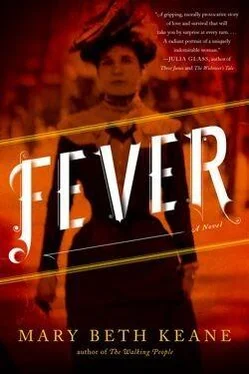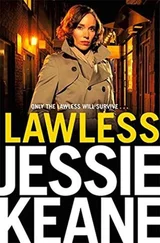• • •
He needed to change his tack. He needed to find a way to explain himself. In the short term, he realized he shouldn’t have locked himself out of Driscoll’s flat. He had his stack of money but he didn’t want to waste it, so he walked over to Eighth Street, to a delicatessen where an old friend from his coal-hauling days worked slicing meat, and asked to sleep in the pallet in their supply room.
In the morning, he waited outside 302 East Thirty-Third, but he must have arrived too late and missed her. He passed by the laundry a few times to kill the hours until they closed, but didn’t catch any glimpses of her. Christmas was now only eight days away. Pale children begged from morning until night, and there was a Santa on every other block. The markets smelled of clove and cinnamon and the men hocking evergreens were asking astonishing prices for trees that by New Year’s would be brown and brittle and back on the curb.
What he needed was courage. What he needed was to figure out exactly the right thing to say. He shoved his fists deep into his coat pockets because when he set them free his arms felt out of rhythm with his body. He put up his collar. He walked faster. His flask was empty now, and he kept reminding himself to go to Oppenheimer’s office for more of the medicine, but it was like the old prayers of his childhood: his mind said the words but the words were meaningless and he barely heard them. The thought of filling it with something better came to him innocently, the first time, as he passed a pub he used to like. But as soon as the thought entered his mind it gained traction, and wouldn’t be pushed away. He tried to think instead of how he and Mary would talk, finally, and how life would go on, but every time he let his guard down there it was, an itch in his chest demanding to be scratched. He walked and walked and bought a comb for his hair and better socks for his feet, but there it was, squatting in the corner of his mind and smirking at him. If I limit myself to a dram, he considered. His groin tingled. He felt his pulse in the soles of his feet and his fingertips. If I tell the barman it’s only the one, and to not under any circumstances sell me another. If I drink it up quickly and then go on my way. If I never do it again after this.
He walked back to the pub he’d passed that morning. Quickly, quickly, he caught the barman’s eye and held up his first finger. The barman found a bottle, and Alfred nodded. The barman found a glass, set it on the bar, poured from one vessel into the other, all of which Alfred watched closely, as if trying to spot the sleight of hand in a card trick. The barman restored the bottle to the shelf and placed the glass in front of Alfred. Alfred removed his hat, swallowed it down, and returned the empty glass to the bar.
“Jeez, brother,” the man said, eyeing him. “We don’t run tabs here.”
“I have money.”
The second time, Alfred looked at the amber liquid for a moment before swallowing it in two long gulps. The polished wood of the bar stretched out to his right and curved into the shadows at the back of the room. The glasses lined up in neat rows behind the barman caught the faint sun coming through the windows. He felt nervous out there in the city, the tendons and sinews of his body mimicking the hectic pace all around him, leaving him exhausted, leaving him unable to relax, his ears always cocked like a hare waiting for the sound of approaching hounds. Here, Alfred noticed, the encroaching city stopped its march at the door, and at the center of his body the heat from those two small drams worked better than any overcoat, worked better than the warmest feather bed. The others seated at the bar were silent except for a pair of gentlemen toward the back discussing something in a whisper. There was no music playing, and the barman had not even bothered to put out the token plate of cheese. Alfred felt a familiar calm traveling outward from his belly. He had lost his mother as a boy but he knew that feeling was what a boy feels when he steps into his mother’s arms, that tenderness, that fierce compassion. He shifted in his stool to find the familiar position. He rested his chin to his fist.
He counted the days since he’d shown up for work at the stable, and wondered if he still had a job. If they fired him, maybe it would be for the better. That way when he got his fresh start with Mary he’d find something else. He ordered a beer with his whiskey. He could move furniture, maybe. He could go out and harvest ice instead of waiting in the stables for it. When the quitting hour rolled around he didn’t bother going over to the laundry, deciding instead that he’d have better luck catching her outside their old building. He didn’t bother with dinner or supper. The other men left and a new group took their places. His stack of cash was getting lighter, and sometime after supper, after the barman had cleaned the glasses and wiped down the top of the bar, he asked Alfred if he had somewhere to go. Alfred straightened up, leapt from the stool, hurried out to the street.
The laundry had been closed for several hours, so Alfred sat inside the vestibule of 302 East Thirty-Third Street for six hours before she appeared. He was leaning with his back against the wall, his legs stretched out in front of him, when he opened his eyes to find her looking down on him with a newspaper under her arm and an umbrella in her hand.
“What are you doing?” she said.
“Waiting for you.”
She leaned over to sniff the air, and then like she’d been scalded she jumped, pulled her long skirt to the side, and tried to step past him to the front door.
“Wait,” he said, and quick as could be he reached for her ankle. He felt that delicate knob of bone move under his thumb as she tried to wriggle free.
“Let me go,” she said with that fierce look she got whenever she was angry. He let go. “What do you want? Why are you here? I wish you’d keep away from me.”
“Didn’t you hear me say I’m not married? I didn’t marry her.”
Mary gave one of those quick breathy laughs he knew marked the point when she was about to lose her temper completely. He stood and stepped back until he was against the wall. He’d forgotten what she could be like. He’d forgotten everything. She held her pointing finger one inch from his nose.
“You stay away from me, do you understand? Don’t come to the laundry. Don’t come to this building. Don’t look for me on the street.”
“You don’t mean it. I know you don’t mean it.” He thought of her stooping over him in the early mornings. He thought of her pushing his clothes into the tub, and wringing them, and shaking them out in two deft snaps before hanging them by the stove. He thought of the soft swing of her breasts while she worked, and the swell of her bare white hip in the morning, and the way she was careful about her hands, always rubbing the fingertips in lemon to take away the odor, and how he wanted to kiss those hands now and tell her that she could not send him away. Sometimes, not often, but sometimes, she would listen to a story he told her, about the bar, about some person he’d met there, and if the story was funny she’d laugh. She’d drop what she was doing, sink into her side of the bed, and laugh. Sometimes, not often, she would ignore the dawn light that insisted it was time to wake up, and instead she’d roll over toward him, throw her arm over his chest, make a nest in the crook of his arm. Even when she was upstate, or in New Jersey, or across town at a situation that didn’t permit journeys home, he never felt alone knowing she would be coming back to him.
She made a small choked sound now, a sound he’d heard out of her only once or twice since she was seventeen. She drew a deep breath, and when she looked at him again she had composed herself.
Читать дальше












